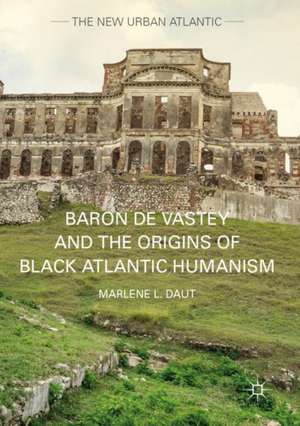Baron de Vastey and the Origins of Black Atlantic Humanism: The New Urban Atlantic
Autor Marlene L. Dauten Limba Engleză Paperback – 12 mar 2019
Preț: 523.81 lei
Preț vechi: 569.36 lei
-8% Nou
Puncte Express: 786
Preț estimativ în valută:
100.23€ • 109.22$ • 84.46£
100.23€ • 109.22$ • 84.46£
Carte tipărită la comandă
Livrare economică 19-25 aprilie
Preluare comenzi: 021 569.72.76
Specificații
ISBN-13: 9781349693764
ISBN-10: 1349693766
Pagini: 244
Ilustrații: XL, 244 p. 8 illus.
Dimensiuni: 148 x 210 mm
Greutate: 0.32 kg
Ediția:1st ed. 2017
Editura: Palgrave Macmillan US
Colecția Palgrave Macmillan
Seria The New Urban Atlantic
Locul publicării:New York, United States
ISBN-10: 1349693766
Pagini: 244
Ilustrații: XL, 244 p. 8 illus.
Dimensiuni: 148 x 210 mm
Greutate: 0.32 kg
Ediția:1st ed. 2017
Editura: Palgrave Macmillan US
Colecția Palgrave Macmillan
Seria The New Urban Atlantic
Locul publicării:New York, United States
Cuprins
1 Introduction: Baron de Vastey in Haitian (Revolutionary) Context.- 2 What’s in a Name? Unfolding the Consequences of a Mistaken Identity.- 3 The Uses of Vastey: Reading Black Sovereignty Through Baron de Vastey in the Atlantic Public Sphere.- 4 Baron de Vastey’s Testimonio and the Politics of Black Memory.- 5 “Baron de Vastey and the Twentieth-Century Theater of Haitian Independence.
Recenzii
“This is a richly documented study of this key figure in the invention of the radical anti-slavery movement and anti-colonialism, and will be essential reading for scholars and students of Haitian Revolutionary studies and postcolonial theory.” (Nick Nesbitt, French Studies, Vol. 73 (3), July, 2019)
Notă biografică
Marlene L. Daut is Associate Professor of African Diaspora Studies in the Carter G. Woodson Institute for African American and African Studies and the Program in American Studies at the University of Virginia. She is the author of Tropics of Haiti: Race and the Literary History of the Haitian Revolution in the Atlantic World, 1789-1865 (2015).
Textul de pe ultima copertă
Focusing on the influential life and works of the Haitian political writer and statesman, Baron de Vastey (1781-1820), in this book Marlene L. Daut examines the legacy of Vastey’s extensive writings as a form of what she calls black Atlantic humanism, a discourse devoted to attacking the enlightenment foundations of colonialism. Daut argues that Vastey, the most important secretary of Haiti’s King Henry Christophe, was a pioneer in a tradition of deconstructing colonial racism and colonial slavery that is much more closely associated with twentieth-century writers like W.E.B. Du Bois, Frantz Fanon, and Aimé Césaire. By expertly forging exciting new historical and theoretical connections among Vastey and these later twentieth-century writers, as well as eighteenth- and nineteenth-century black Atlantic authors, such as Phillis Wheatley, Olaudah Equiano, William Wells Brown, and Harriet Jacobs, Daut proves that any understanding of the genesis of Afro-diasporic thought must includeHaiti’s Baron de Vastey.
Caracteristici
Winner of the 2019 Haitian Studies Book Award Brings to light the contributions of Haitian statesman Baron de Vastey in the development of postcolonial and critical race theory Demonstrates the influence of de Vastey's writings and the work of prominent nineteenth and early twentieth-century abolitionists and anti-colonialists Argues for the significance of writing by people of color from French Saint-Domingue dating to before formal Haitian independence Includes supplementary material: sn.pub/extras












